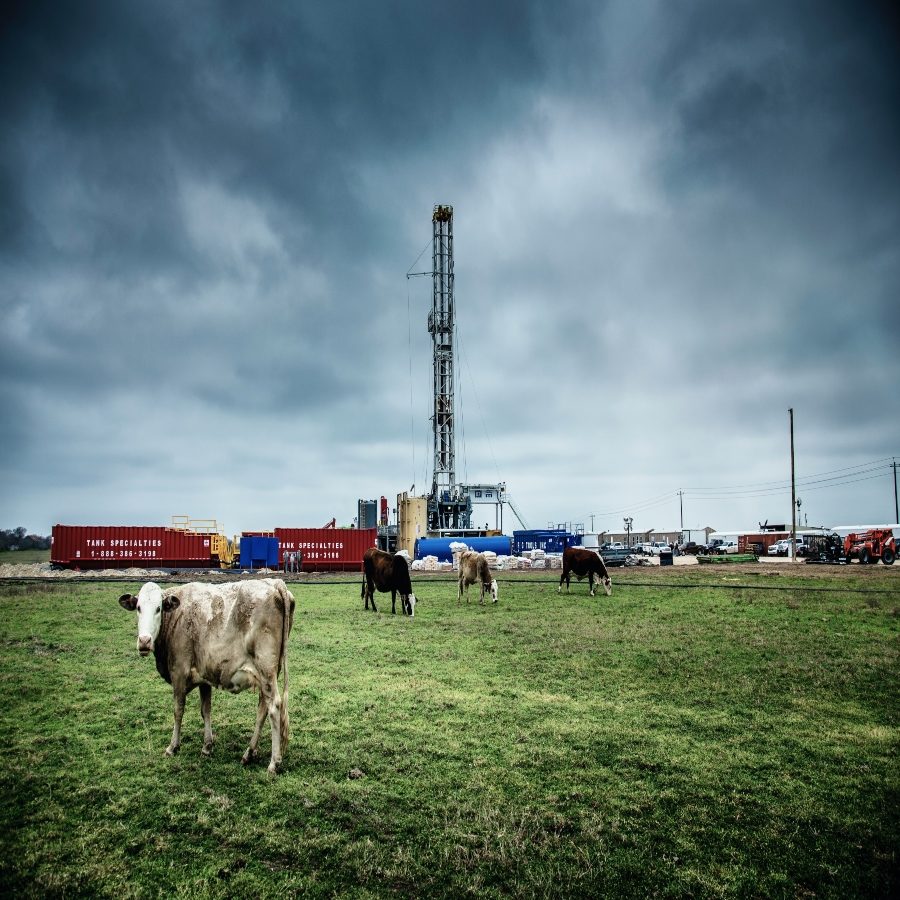
Oil Drills
She reached into the fridge for one of those individual tubs of yogurt designed to release the digestive tract. Her mother arrived and filled the house with reminders of her climbing age: thick orthopedic shoes by the door, prescription meds strewn across the bathroom counter, short gray hairs embedded in the carpet. There was a baby shower: mountains of diapers and blankets and onesies patterned with dinosaurs. She remembered dressing her first child in these items, alone in her ex-husband’s home. He left before dawn every morning and returned late, not because he preferred to have sex with someone else, but because he experienced something much more offensive—the determination to advance in the ranks of his employer. Now she was pregnant for the second time, married just as many.
The yogurt made her stomach turn and she spit it in the sink. At the baby shower, her mother gave an unbearable toast about this process bringing together every woman everywhere. That in a time of such divisiveness and unrest, it was the children who reminded us all of our inner unity.
Her mother was wispy, approaching mysticism, and small currents of mascara flooded the folds that had set in her face over the past few years.
“To love,” her mother said, raising a glass of pink liquid, “and to rebirth.” The women surrounding her smiled, followed her lead, and drank from their glasses. She barely knew these people: women from high school, from down the street. She didn’t know what love had to do with rebirth nor what love had to do with the birth of this child, but she raised her glass all the same, sloshed the too-sweet juice down her throat.
Most nights, her second husband came to bed around midnight. He pulled back the sheets and rested his ear upon her bare stomach, always growing as if to meet him halfway. It was a ritual they never agreed upon as if this part of her body was divided between them. The pregnancy separated her into thirds—one for the child, one for her husband, one for her. She slept, then woke up around three in the morning and plugged headphones in, listening to the news of faraway countries in unfamiliar languages, lulling herself back.
Years ago, she sat at a quiet table in the back of a club, near the bathrooms, knees pressed against the first man who would get her pregnant. Their conversation only paused at the grating sound of vomit racing into a toilet bowl from behind the closed door. She stared at his long, dark hair as he explained himself to her. He studied at the city’s university and had dreamt from a young age of advancing cloud seeding technology.
Cloud seeding, he told her, is a type of weather modification that changes the amount of precipitation that falls from the clouds. Substances are released into the atmosphere that transforms the clouds—so nothing is destroyed, just altered.
This reminded her of something her mother told her as a child. Each time an eyelash or nail clipping or baby tooth fell from her body, it arrived in someone else’s pocket, so no part of her was ever lost.
“Remember that,” her mother had said, pulling a glass of wine to her face. “No part of you is ever lost, it’s just waiting to be found somewhere else.”
She told him this and it was over. The way his eyebrows softened, the half-smile that stretched across his face. He loved her now, already.
He was gentle, brushing the damp hair from her forehead, slowing whenever she winced.
“I didn’t know it would be like this your first time,” he said. No one really tells you anything, she wanted to say, do they?
He said he was flying home, across an ocean, before she could put words to the growing within her.
She met the man who would become her first husband in a grocery store. He was staring at slabs of fish atop crushed ice. They married within the week, eloping at a nearby national park. Oil drills obscured the mountains, and she knew that this place—like her marriage—would be short-lived, even though it came with the intention of eternity. She wondered if life was defined by the men she met and the things they gave her. But this thought depressed her, and so instead she focused her eyes on the drill digging into the earth, searching for the remnants of ancient beings, compressed and transformed, as he spoke his vows to her.
He would love the child, but only in relation to her. When she left him, he would forget altogether about the daughter, still soft and biting.
The news floating in her ears each night probably spoke of bombs and drones and climate collapse, no matter the language. She woke in the morning to her mother pacing in the kitchen, blending peas and apples into a paste for the baby; her husband leaving, going to an office where he was needed and useful. And she lay in bed, hands around her swollen belly. Nothing she had lost over the years was wanting to be transformed and found, nothing at all.
Lauren Weber (she/her) is a queer writer and graduate student living in the Midwest.
Submit Your Stories
Always free. Always open. Professional rates.
